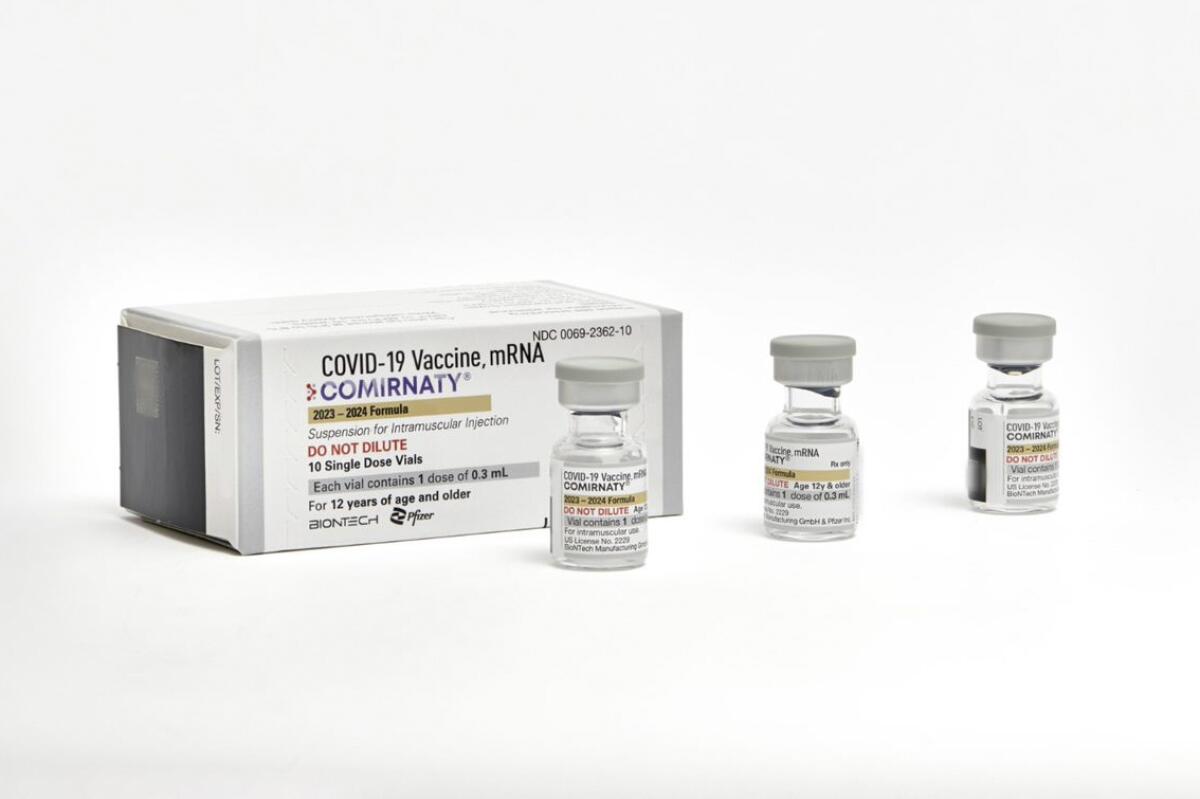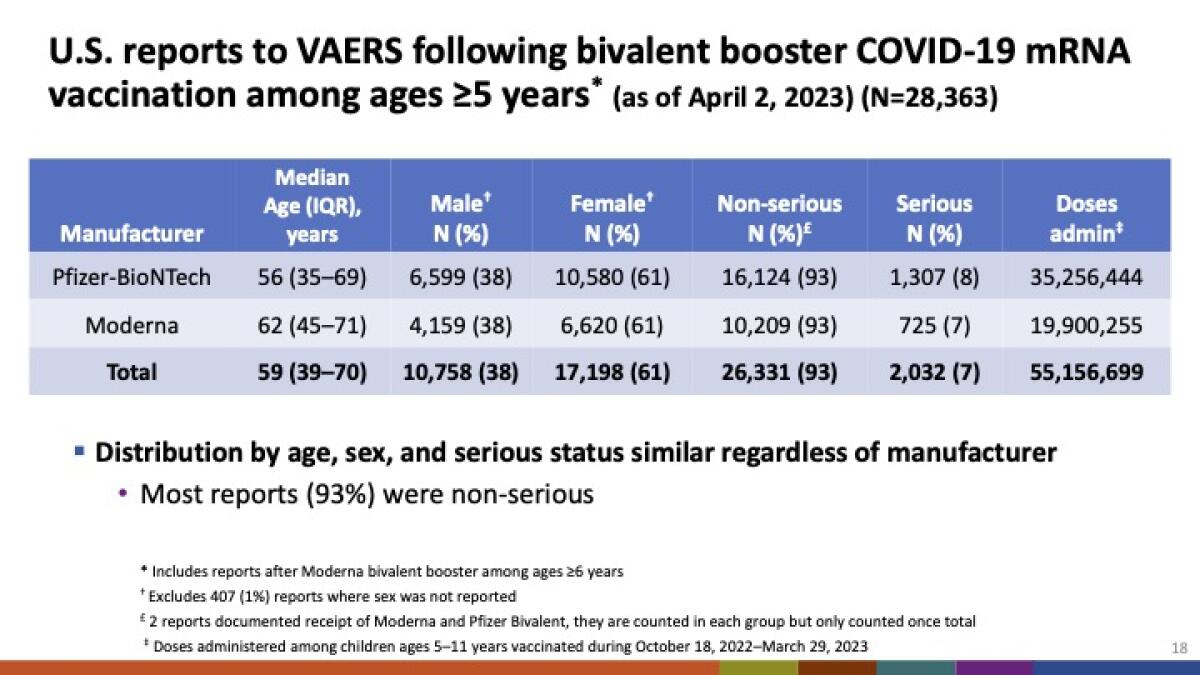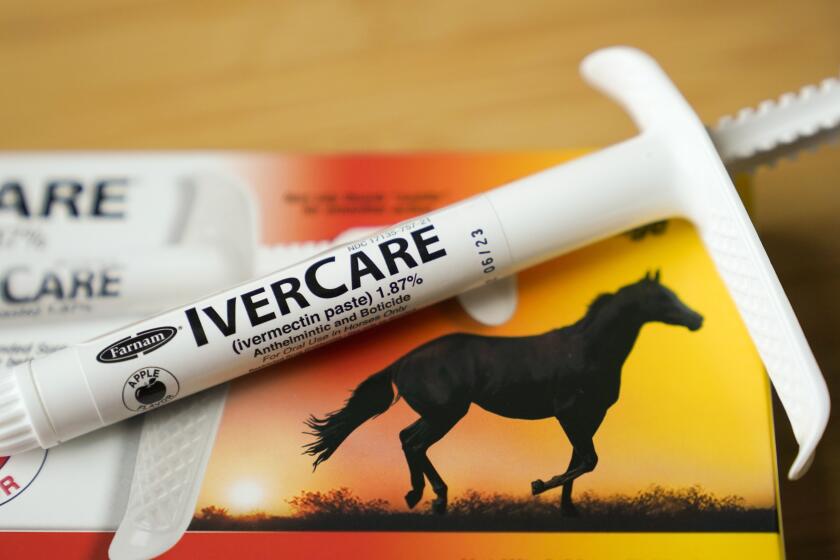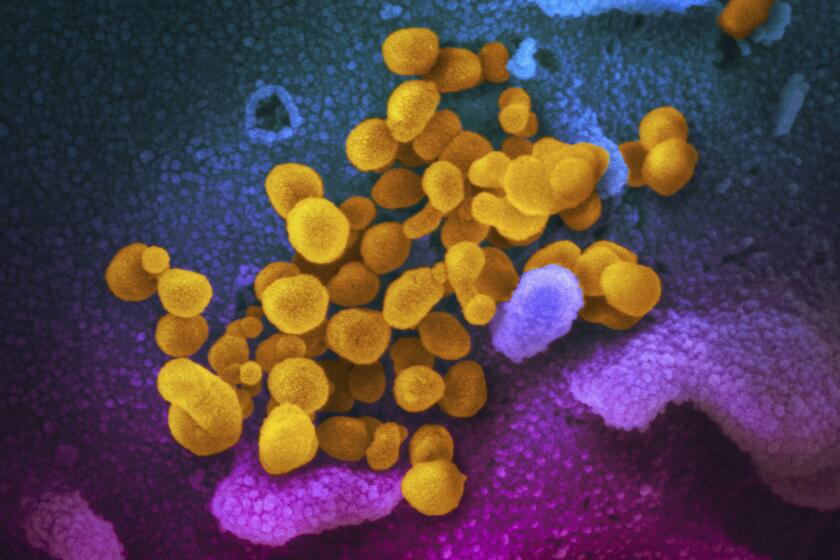Why anti-vaxxers are pretending a flawed study on vaccine deaths has been vindicated

- Share via
Over the weekend, as I pondered a volume of forgotten lore — it was Emily Wilson’s gripping translation of Homer’s “Odyssey,” actually — my email inbox started filling up with the curious news that a long-discredited and retracted paper claiming that the COVID vaccines had killed nearly 300,000 Americans had been “reinstated.”
It did not take long to determine that the truth was, no, not really. But the sudden appearance of this claim and its rapid spread across the anti-vaccine ecosystem speak volumes about how “bad papers written by antivax ideologues designed to promote a narrative that vaccines are dangerous and/or ineffective ... never die,” to quote the veteran pseudoscience debunker David Gorski.
“Junk science can often find a home somewhere in the bowels of the literature, but that doesn’t stop it being junk science,” says John P. Moore, professor of microbiology and immunology at Weill Cornell Medical College, whose experience fighting anti-science quackery dates to the AIDS epidemic of the 1990s.
Bad papers written by antivax ideologues designed to promote a narrative that vaccines are dangerous and/or ineffective...never die.
— Pseudoscience debunker David Gorski
In this case, the assertion that a retracted paper by Michigan State University economist Mark Skidmore has been resurrected in the peer-reviewed literature is based on “one possibly accurate piece of information, a lie, and a half-truth,” Gorski observes.
Let’s take a look.
Get the latest from Michael Hiltzik
Commentary on economics and more from a Pulitzer Prize winner.
You may occasionally receive promotional content from the Los Angeles Times.
I wrote about Skidmore’s paper in April, when it was retracted by its original publisher, the respectable medical journal BMC Infectious Diseases.
Published in January, the paper had started out as a sort of sociological study of what factors might lead people to be more or less amenable to taking a COVID-19 vaccine.
Based on an anonymous database of 2,840 respondents compiled by a third-party survey firm, Skidmore reported that people who knew someone who had a serious bout of COVID illness were more likely to get vaccinated, while knowing someone who appeared to have suffered a post-vaccination injury made them less likely to take the shot.
That was not especially surprising. But Skidmore proceeded to extrapolate from the number of respondents who said they knew someone who had died from the vaccine to conclude that the number of U.S. vaccine-related deaths “may be as high as 278,000.”
Hiltzik: Right-wing judges are on a mission to stop the FDA from warning consumers about snake oil
Right-wing hacks on the 5th circuit federal appeals court, emboldening medical charlatans, questioned the FDA’s advice not to take ivermectin for COVID-19.
That claim was taken as gospel truth by the anti-vaccine movement, which helped make the paper one of the most-viewed papers in the journal’s history.
But there was a problem. Skidmore based his estimate of vaccine-related deaths on the opinions of people who had no way of knowing that the illness or death their acquaintances suffered after vaccination had anything to do with the shot.
Another red flag was that he relied on the Vaccine Adverse Events Reporting System, or VAERS, as a benchmark database for COVID vaccine injuries.
VAERS is maintained by the Centers for Disease Control and Prevention, which warns explicitly that it’s not suitable for that purpose. That’s because it’s a repository of entirely voluntary reports that can be filed by anyone, including but not limited to doctors, patients and family members, who aren’t required to document the injury.
“VAERS is not designed to determine if a vaccine caused or contributed to an adverse event,” the CDC says. “A report to VAERS does not mean the vaccine caused the event.”
When serious vaccine scientists see VAERS treated in a paper as an authoritative source for injury estimates, they take it as a sign that the paper is sloppy or even willfully dishonest. As it happens, VAERS is a popular source for anti-vaccine claims of all sorts, especially about the COVID shots.
As I observed before, there are few fields in which flawed scientific research has been weaponized as much as in studies of COVID treatments. Worthless nostrums such as hydroxychloroquine and ivermectin have been promoted as COVID treatments based on transparently bogus evidence.
Skidmore disagreed with BMC’s retraction notice in April, and still does. He maintains that BMC’s retraction violated professional standards, although one rule he cited is that a journal has “clear evidence that the findings are unreliable.”
Yet BMC’s retraction notice cited “concerns ... regarding the validity of the conclusions drawn after publication.” It said Skidmore’s methodology in estimating vaccine deaths “was inappropriate as it does not prove causal inference of mortality. ... Furthermore, there was no attempt to validate reported fatalities.”
Joe Rogan, Robert F. Kennedy Jr. and other anti-vaccine conspiracy-mongers keep insisting that experts debate them in public. The experts are right to refuse.
“My article is one piece of evidence among many that the COVID-19 vaccines have resulted in injury and death,” Skidmore told me by email.
That’s what lawyers might call “assuming facts not in evidence.” For there is no “evidence” in Skidmore’s paper that the vaccines have resulted in injury and death to any degree that would make them more dangerous than contracting COVID-19 — just unsupported conjectures by acquaintances of people who died at some point after getting vaccinated that their deaths resulted from the shots.
The evidence is overwhelmingly on the other side — that the vaccines have saved millions from the dire consequences of the disease.
That brings us to the reported “reinstatement.” Or as anti-vaccine activist Steve Kirsch put it on his Substack blog, “after a 7 month review by his university, Mark Skidmore was exonerated of all charges and his new, improved paper was published in a more credible peer-reviewed journal.”

Following Gorski’s formulation, we’ll start with the “one possibly accurate piece of information.” That piece is a ruling by Michigan State’s Institutional Review Board, which oversees the ethics of research involving human subjects. On Sept. 13, the board informed Skidmore that it had found “no noncompliance” with its protocols.
That may be understandable. Skidmore’s defense against accusations of unethical treatment of human subjects that his critics had brought to the IRB was that he had based his paper on an anonymized third-party database, so he had no direct clinical contact with any human subjects and the research thus “posed little risk to human respondents,” according to Liberty Counsel, the conservative legal group that represented him in discussions with the IRB.
But that doesn’t get to the core problem of the paper. The “lie,” as Gorski describes it, is Skidmore’s claim that “COVID-19 vaccines might have killed well over a quarter million people by the end of 2021.”
There are simply no data to support that assertion. Skidmore’s calculation is a wild extrapolation from unreliable reports. It flies in the face of more solid evidence, which validates the CDC and Food and Drug Administration findings that the vaccines are safe. A 2022 FDA study, covering COVID vaccinations through mid-November 2021, found that death reports on VAERS were actually lower than all-cause death rates.
The most recent CDC statistics showed that of the 26,331 VAERS reports of problems from the bivalent boosters developed by Moderna and Pfizer authorized by the FDA in August 2022 and delivered through last spring, 2,032 were “serious,” a category that presumably includes death.
Trump blocked a study of bat viruses for political reasons. His meddling has finally been reversed, but the world lost years of potentially life-saving research.
Because 55.2 million doses of the boosters had been delivered since then, the rate of “serious” complications came to less than four-thousandths of a percent of doses. And that figure was probably exaggerated, since the VAERS reports are, by their nature, unsubstantiated.
Finally, there’s the “half-truth.” That’s the assertion that Skidmore’s study has been restored to the peer-reviewed literature.
First of all, it’s still retracted by BMC, and there are no indications that the journal will backtrack, since its retraction was the result of extended negotiations with the journal editors, ending with Skidmore’s acknowledgment that he had no way of knowing whether the study subjects’ perceptions about their acquaintances’ vaccine-related injuries were accurate.
“Validating reported fatalities is not possible with an anonymous survey,” Skidmore told the editors. Kirsch asserted on Substack that Skidmore’s “new, improved paper was published in a more credible peer-reviewed journal.” Is that so?
There are barely any differences between the original paper and the new version, which has been published in a journal called “Science, Public Health Policy, and the Law,” issued by the Institute for Pure and Applied Knowledge. The institute is a repository and publisher of anti-vaccination reports, including the long-discredited claim that autism is a consequence of childhood vaccinations.
As for the journal, its editorial board is composed 100% of vaccine skeptics, outright anti-vaxxers and dispensers of medically and scientifically unsupported treatments. Among its most recent articles is one that, amazingly, continues to push the antimalarial medication hydroxychloroquine as a treatment for COVID-19, despite overwhelming evidence that it’s useless for the purpose. (That paper’s co-author is Mark Skidmore.)
To assert, as Kirsch does, that this journal is “more credible” than BMC Infectious Diseases, which is associated with the Nature publishing group, must be some sort of a gag. It’s true that questions have been raised about how BMC came to publish Skidmore’s paper in the first place, but at least the journal retracted it after critics pointed out its flaws.
The political landscape of COVID remains infected with misinformation on a pandemic scale. The Skidmore case underscores an observation seen in science, business and politics: Bad information always prevails over good information, unless the truth fights back, constantly and vigorously.
More to Read
Get the latest from Michael Hiltzik
Commentary on economics and more from a Pulitzer Prize winner.
You may occasionally receive promotional content from the Los Angeles Times.














